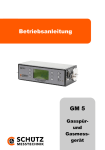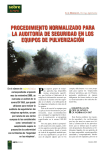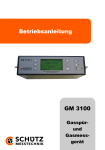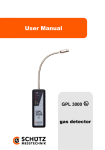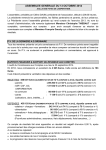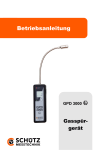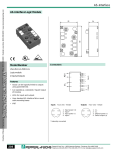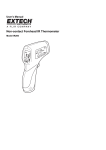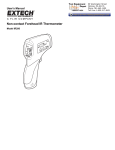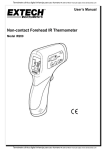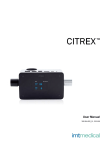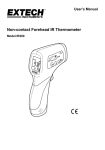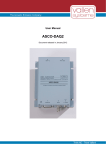Download Operating instructions GM 5
Transcript
Operating instructions GM 5 Gas detection and measurement instrument Operating instructions: GM 5 Summary 1 INTRODUCTION.....................................................................................5 1.1 CONSERVATION........................................................................................................5 1.2 DEFINITIONS ACCORDING TO DIN 31051 2003-06, EN13306 :...................................5 1.3 DEFINITIONS ACCORDING TO G 465-4 :........................................................................5 1.3.1 G465-4, Section 5,3 Steps.............................................................................................5 1.4 LIABILITY FOR FUNCTION OR DAMAGES............................................................................6 1.5 W ARRANTY.............................................................................................................6 1.6 STORAGE................................................................................................................6 1.7 UNITS PPM, VOL.%.................................................................................................8 1.8 THE APPLICATIONS....................................................................................................9 1.9 USE OF THE DEVICE IN AREAS WITH POTENTIALLY EXPLOSIVE ATMOSPHERES...........................11 1.9.1 Note:..............................................................................................................................11 1.10 AFTER TURNING ON THE INSTRUMENT AND WARM-UP TIME...............................................12 1.11 THE AUTOMATIC MEASUREMENT SELECTION IS CONNECTED...............................................12 1.12 TEST PRINCIPLE (EXAMPLE WITH 10 TEST GASES)........................................................13 2 CONTROL UNIT OF THE GM 5............................................................14 2.1 OPERATION AND FUNCTION OF THE DIFFERENT KEYS ........................................................14 2.1.1 2.1.2 2.1.3 2.1.4 2.1.5 2.1.6 2.1.7 2.1.8 FUNCTION KEYS.........................................................................................................14 ON / OFF......................................................................................................................14 MENU............................................................................................................................15 ZERO POINT................................................................................................................15 UP / DOWN..................................................................................................................15 LOUDSPEAKER..........................................................................................................16 ALARM..........................................................................................................................16 BATTERY.....................................................................................................................16 2.2 STRUCTURE OF THE MEASUREMENT DISPLAY..................................................................17 2.3 STRUCTURE OF THE MEASUREMENT DISPLAY GROUND-AIR ...............................................17 2.4 INFORMATION ABOUT CO2 MEASUREMENT....................................................................17 2.5 STABILITY CRITERION...............................................................................................18 3 FUNCTIONS OF THE GM 5..................................................................19 3.1 SELECTING THE APPLICATION.....................................................................................19 3.2 ADJUSTABLE ALARM LIMIT..........................................................................................21 3.3 AUTOMATIC RANGE SELECTION....................................................................................23 3.4 MEMORY..............................................................................................................24 3.4.1 Deleting a memory location..........................................................................................24 3.4.2 Saving a set of data......................................................................................................25 3.4.3 Opening a set of data...................................................................................................25 3.5 DISPLAY SETTINGS..................................................................................................26 3.5.1 Adjust illumination limit and automatic illumination......................................................27 -2- Operating instructions: GM 5 3.5.2 Set contrast...................................................................................................................28 3.6 SYSTEM SETTINGS...................................................................................................28 3.6.1 Set time and date..........................................................................................................29 3.6.2 Selecting the language.................................................................................................29 3.6.3 Drag indicator................................................................................................................30 3.6.4 Set Zeroing Function....................................................................................................31 3.7 MINIMUM SENSITIVITY TEST........................................................................................31 3.7.1 Test minimum sensitivity..............................................................................................32 3.7.2 Evaluate minimum sensitivity tests..............................................................................33 3.7.3 Delete minimum sensitivity test results........................................................................33 3.8 INFO-DISPLAY........................................................................................................34 3.9 CHARGE ACCUMULATORS .........................................................................................34 4 MAINTENANCE.....................................................................................36 4.1 FILTER REPLACEMENT.............................................................................................36 4.2 CLEANING A SINTERED FILTER...................................................................................36 4.3 CHANGING ACCUMULATORS........................................................................................38 5 MISCELLANEOUS................................................................................38 5.1 ZERO POINT AUTOMATIC............................................................................................38 5.2 ALARMS...............................................................................................................39 5.2.1 Acknowledgement of Alarms........................................................................................39 5.2.2 Battery Alarm................................................................................................................39 5.2.3 Pump Alarm..................................................................................................................40 5.2.4 Gas Detection Alarm (GA)............................................................................................40 5.2.5 Localization Alarm (LA)................................................................................................40 5.2.6 Pre-Alarm (VA).............................................................................................................41 5.2.7 Main Alarm (HA)...........................................................................................................41 5.2.8 Overview of Gas Alarms..............................................................................................41 5.3 CAR CHARGER.......................................................................................................42 5.4 CHARGER.............................................................................................................42 6 ERROR DESCRIPTIONS AND SOLUTIONS........................................43 6.1 RESET.................................................................................................................44 7 TYPE PLATE......................................................................................... 45 8 TECHNICAL DATA................................................................................46 9 ACCESSORIES.....................................................................................48 9.1 CARPET PROBE......................................................................................................48 9.2 BORE HOLE PROBE WITH WATER SEPARATOR..................................................................48 9.3 CUP PROBE...........................................................................................................49 9.4 TRENCH PROBE......................................................................................................49 9.5 TELESCOPIC BORE HOLE PROBE..................................................................................50 9.6 TELESCOPIC AERIAL PROBE IN DIFFERENT VERSIONS.........................................................50 -3- Operating instructions: GM 5 9.7 W ATER STOP FILTER...............................................................................................51 9.8 CAR CHARGER WIRE 12V.........................................................................................51 10 TESTING AND ACCESSORIES..........................................................52 11 SPARE PARTS....................................................................................53 12 EC DECLARATION OF CONFORMITY..............................................54 13 TEST REPORT....................................................................................55 -4- Operating instructions: GM 5 1 Introduction 1.1 Conservation Repair work may only be done by the service of Schütz GmbH. Only original SCHÜTZ parts should be used. 1.2 Definitions according to DIN 31051 2003-06, EN13306 : Inspection Maintenance Repair Improvement = Measures to identify and assess the actual condition of an observation unit = Measures to delay the degradation of the existing wear out reserve = Measures taken to return an observation unit into the operational condition = Combination of all technical and administrative measures and actions taken by management to increase the functional security of an observation unit, without changing the function required of it 1.3 Definitions according to G 465-4 : 1.3.1 G465-4, Section 5,3 Steps 1. Function check (Paragraph 5.1) 2. Examination of the display accuracy (calibration) see the publications of the DVGW and manufacturers of the devices 3. Conservation see Schütz GmbH Messtechnik, Technische Info -5- Operating instructions: GM 5 1.4 Liability for function or damages Die The responsibility for the function of the instrument always passes over to the proprietor or operator when the instrument is not properly maintained or repaired by persons not belonging to the Service of Schütz GmbH, or in case the instrument is used for any purpose which does not correspond to the intended use. The instrument may not be used for the exact evaluation of a gas concentration – it merely serves to locate gas accumulations. Avoid the intake of water, thus, the sensors can be destroyed. Turn on the instrument only in clean ambient air (no gas concentration present) since here the zero point for the sensors will be set. 1.5 Warranty There is a 24 month warranty on all instruments, counting from the date of purchase. In case of missing or damaged warranty seals, the warranty is voided. SCHÜTZ-GMBH MESSTECHNIK 1.6 Storage After a prolonged storage, charge the instrument to achieve the maximum operation time (self discharge). -6- Operating instructions: GM 5 Operating instructions GM 5 The GM 5 is designed to search and pinpoint gas leaks in interior and exterior areas according to G465-4. The GM 5 offers you the results of our long experience combined with the newest technology. With our instrument you can minimize measurement errors. It fully complies with the growing requirements for measurement security and ease of use. The GM 5 has a graphic display allowing a user friendly menu guidance. The instrument’s digital indication was designed specifically for the gas industry (combination: analogical and digital display). Both the tendencies and the absolute values are easily recognized. To encircle a leak point during gas detection work is considerably easier with an indicator that is similar to an analogical measurement instrument (analogical measurement of tendency). A closer reading through the digital display is essential to locate reliably as well as in estimating an hazard during a gas concentration measurement. Both characteristics in one single instrument ensure optimum work and maximum security on the job. When the automatic measurement range is turned on, the GM 5 selects the smallest possible range. It prevents overlooking a leak because of the choice of a too large measurement range. With very high concentrations of gas, the GM 5 prevents the sensor caused erroneous measurement in the 1 Vol.% and 5 Vol.% measurement range. The instrument is also equipped with an electronically regulated pump, delivering app+rox. 90 litre/hour. Special filters are installed to protect the pump and the measurement chamber. To read measurement values in the dark, the light of the LCD indicator turns on automatically. -7- Operating instructions: GM 5 1.7 Units ppm, Vol.% Alle All the following units refer to methane(CH 4), unless stated otherwise. The unit ppm refers to volume: 1 ppm = 1 cm³ 100 % test gas distributed in 1 m³ of surrounding air 10 ppm = 10 cm³ 100 % test gas distributed in 1 m³ of surrounding air The unit Vol.%: 0,1 Vol.% = 1 dm³ 100 % test gas distributed in 1 m³ of surrounding air 1 Vol.% = 10 dm³ 100 % test gas distributed in 1 m³ of surrounding air Conversion factors: dm³ 0,01 0,1 1 10 100 1000 = = = = = = ppm 1 10 100 1.000 10.000 100.000 1.000.000 cm³ 10 100 1.000 10.000 100.000 1.000.000 = = = = = = = = = = = = = Vol.% 0,0001 0,001 0,01 0,1 1 10 100 m³ 0,00001 0,0001 0,001 0,01 0,1 1 = = = = = = = = = = = = = Liter 1/100 1/10 1 10 100 1000 CH4 in 1m³ Luft 1 cm³ 10 cm³ 100 cm³ 1 dm³ 10 dm³ 100 dm³ 1 m³ -8- Operating instructions: GM 5 1.8 The applications One of the most important innovations is the selection of the appropriate application from a menu. The different applications use their own settings, like alarm threshold and pump flow. These can be changed at any time by the user. In addition, different sensors are active in the various applications. The sensor principles used in the GM 5 are: • Semiconductor sensor, SC (ppm range) • Thermal tone sensor, TT (5% range / LEL) • Thermal conductivity sensor, TC (100% range) • Infrared sensor, IR (CO2 evidence) The following table provides an overview of various applications with the preset flow rates and alarm thresholds, and the sensors used. -9- Operating instructions: GM 5 Application Description Sensors used Alarm limit Flow AboveGround Above-Ground survey of underground pipes SC, TT, TC Detection alarm (DA) 10 ppm 1,2 l/min Ground-Air Survey of Ground-Air / locate TC, IR G H Lying exposed Q Building K Survey of exposed gas pipes SC, TT, TC Survey inside building SC, TT, TC Survey of cavities SC, TT, TC Filling and emptying gas pipes TC Cavity I Gas purity J -10- 1,0 l/min Localization alarm (LA) 100 ppm till 2,2 Vol% (concentrationrelated alarm impuls) Pre alarm (PA) 0,45 Vol.% Main alarm(MA) 2,2 Vol.% Pre alarm (PA) 0,45 Vol.% 0,5 l/min 1,0 l/min 1,0 l/min 0,8 l/min Operating instructions: GM 5 1.9 Use of the device in areas with potentially explosive atmospheres The GM 5 is classified into the temperature-class T3. A maximum surfacetemperature of 200°C results from it. Following table shows the ignition-temperature of the gases: Gas Temperature Methane (CH4) 595°C Propane (C3H8) 470°C Butane (C4H10) 365°C Hydrogen (H2) 560°C Acetylene (C2H2) 305°C According to EN 50014 clause 5.3, the lowest ignition-temperature of the possibly explosive atmosphere must be higher than the maximum surfacetemperature. 1.9.1 Note: The instrument must be loaded only outside the explosive area with the allowed charger. Removing the batteries in the potentially explosive area is not allowed. The device may be adjusted only outside the explosive area. After unplugging the charger, wait at least 1 minute before using the instrument in explosive area! -11- Operating instructions: GM 5 1.10 After turning on the instrument and warm-up time • The application Above-Ground is started • The automatic measurement selection is connected 1.11 The automatic measurement selection is connected according to DVGW Technical Sheet G465I and G465-4 At first, check the outer condition of the instrument including the probe system and the function of the control elements. Check the pump and the suction way of the instrument. Turn on the instrument (at zero gas), wait until after the warm up time the instrument is in the application Above-Ground, and make sure that the zero point is stable. Check the available accumulator capacity. To be ready for a day’s work, the accumulator should be completely charged (showing approx. 100 % capacity). The measurement principle used by the GM 5 requires calibration of zero point at 10 ppm CH4. Therefore you have to apply zero gas (synthetic air or ambient air) to the GM 5. Then you can apply 10 ppm CH4 and make the sensitivity check. According to DVGW Technical Sheet G465-4, instruments with gassensitive semiconductor, susceptible to moisture, must be tested with conditioned (moistened) test gas. In most test stations there is an integrated filter to moisten the gas. The sensitivity check may be done in different ways. If you have questions in this regard please call us. We will be glad to help you. There might be various solutions, depending on your circumstances. To mention all the possibilities in this user manual could lead to misunderstandings. We will offer you a special instruction, adapted to your work conditions. -12- Operating instructions: GM 5 1.12 Test principle (example with 10 test gases) This test configuration is needed 8x to check the complete system. Leaks in measurement probes often cause measurement errors. TSG 3008 Sensitivity tests can be OK ESC performed accurately only with a closed system. Switching to the different test gases has to be done without intake of exterior air (drawing). The probes used for work must also be included in the test. Error case measurement probe: Example: Defective suction hose of carpet probe. Instrument shows no indication in spite of applying test gas. Consequence: In real use you will overlook existing leaks! -13- Operating instructions: GM 5 2 Control unit of the GM 5 2.1 Operation and function of the different keys 2.1.1 FUNCTION KEYS The GM 5 has a user friendly menu to guide the operator, allowing selection of the different functions of the instrument. The six keys located immediately right and left of the display ( ) serve as so called function keys, which execute the function mentioned in the display text next to them. 2.1.2 ON / OFF Trike the key ON/OFF to turn the instrument on or off. After turning on the instrument, the zero point for flow is set and the pump turns on. This is followed by the sensor warm-up time. At the end of the warm-up time all sensors are set to 0. This means that at this point fresh air should be taken in, not a gas concentration. To turn the instrument off, press the ON/OFF key a longer time. EA flashing green LED after warm-up indicates that the pump can’t reach the desired gas flow. Replace the filter or clean the sintered filter to solve the problem (see 4.1 Filter replacement and 4.2 Cleaning a sintered filter). -14- Operating instructions: GM 5 2.1.3 MENU This key accesses the main menu of the GM 5 in which the various functions of the device can be selected. 2.1.4 ZERO POINT This key will set the zero point. Please note, that it's not possible to set the zero point under certain circumstances (see 3.6.4). Note: Press the zero-key in application Ground-Air before every measurement (outside of the bore hole). 2.1.5 UP / DOWN The arrow keys can be used in the application screen to choose a different measurement range or to activate or deactivate the Automatic range selection. In the menu, this keys allow selection and setting of different options. -15- Operating instructions: GM 5 2.1.6 LOUDSPEAKER the This key can be used to acknowledge active alarm signals of instrument. The alarm sound then will be silenced but the flashing of the alarm LED can still be seen. The Acknowledgement of all active alarms is indicated in the application display ( ). Please note, that some alarms are can not be acknowledged or only under certain circumstances (see 5.3). 2.1.7 ALARM This key allows setting of the alarm limit for the current application (see 3.2). 2.1.8 BATTERY This key shows the present accumulator voltage and the accumulator capacity. If the charge state of the instrument falls below 10%, the yellow LED starts flashing and an alarm sound is heard. If the voltage drops below a critical value, the device turns ifs elfs off. -16- Operating instructions: GM 5 2.2 Structure of the measurement display Application Measurement range Alarm indicator Memory Charge state Measured value (analog) Flow Measured value 2.3 Structure of the measurement display Ground-Air Compensated value of methane Uncompensated value of methane (also negative) CO2 measurement The compensated methane-value is calculated from the CO2-value and the uncompensated methane-value. 2.4 Information about CO2 measurement The CO2-value is measured by an infrared sensor. This measuring principle is characterized by a very low cross-sensitivity to other gases. However, at high concentrations (> 50%) this measuring method delivers a more strongly fluctuated measurement-value. But such high CO2 concentrations are very unlikely. -17- Operating instructions: GM 5 2.5 Stability criterion After each application launch a preliminary test of stability is carried out. During this stability test the display shows an hourglass and an arrow which indicates the measured value movement. During this test, lead only clean air to the device. The test is terminated as soon as this hourglass disappears. If the display then shows an exclamation point, the stability test was not successful. In this case, restart the device and make sure that it draws only clean air from the environment. If this exclamation point does not appear, the test was successful and the device is ready for use. The renewed appearance of the stability arrow after the stability test indicates that the measured value fell below the zero-point. In this case the new zero-point will be set automatically. The following symbols in the display are showing the state and the stability of the sensor: Sensor is in warm-up phase, measurement is not yet active The stability test was not successful Measured value decreases or increases Stability test active → device not ready yet! -18- Operating instructions: GM 5 3 Functions of the GM 5 3.1 Selecting the application To select the desired application, first press de menu key menu, select Application ( - key). .. In the main In the next display you can choose the desired application. With the > button ( - Key) you get to the next selection screen. After selecting the desired application (for instance Above-Ground) you go to the settings menu for the chosen application. It will show the sensors used and the alarm limit and pump flow set for the application. -19- Operating instructions: GM 5 To change the predetermined alarm limit or pump performance, press the corresponding key next to the entry (e.g.. - key for pump performance). Here you may adjust the desired pump performance with the UP/DOWN keys ( ). OK ( - key) saves the set value, ESC ( - key) exits without saving. Changes in pump performance level are only saved for a particular selected application. The means to change alarm thresholds is discussed in detail in section 3.2. After pressing the OK key ( - key) in the settings menu, you finally navigate to the measurement menu of the selected application. -20- Operating instructions: GM 5 3.2 Adjustable alarm limit One can navigate to the alarm settings screen either via the settings dialog menu in the application screen or by pressing the alarm key ( - key). Should an application have only one alarm threshold level to be adjusted, the applicable settings for this threshold will be displayed directly on screen (i.e. A gas sensing alarm from an above ground application) where necessary adjustments can be made. Here you may adjust the desired value with the UP/DOWN key ( ). OK ( - key) saves the set value, ESC ( - key) exits without saving. An overview of all active alarm threshold level settings is displayed on screen when a selected application has more than one or multiple alarm threshold levels for a specific instrument. By using the > - control ( - button) one can access the various settings pages of the various alarms. -21- Operating instructions: GM 5 The following alarms are adjustable: • Pre alarm (PA) • Main alarm (MA) • Detection alarm (DA) • Localization alarm (LA) By selecting one of the touch areas defined as function keys, the corresponding display for level adjustment of an alarm threshold will be opened. Here you may adjust the desired value with the UP/DOWN key ( ). The OK ( -key) saves the set value, ESC ( - key) exits without saving. The display of an alarm threshold listing and the selection of individual alarm threshold levels is independent of the actively used alarms of any presently selected application. Navigate into the application settings menu to display the alarm threshold level settings used by the active application. An acoustic alarm and blinking red LED will signal that an alarm has been triggered when the measured value has exceeded a pre-defined threshold setting used by the active application (please see section 5.2 - Alarms). -22- Operating instructions: GM 5 3.3 Automatic range selection The GM 5 has an automatic measurement range. It will choose de adequate measurement range depending on the measured gas concentration. The symbol in the display shows that the automatic measurement range is active. To disconnect the automatic measurement range you press the UP or DOWN key ( ). This will open the automatic measurement range menu. By pressing the - button ( - key), you can enable or disable the automatic measurement range mode. Pressing OK ( - key) is used to confirm entry of a made setting and returns to the measurement menu. Range of Measurement With automatic range measurement disabled you can manually select the desired measurement range with the UP or DOWN keys ( ). The measurement ranges selected depend on the choice of selected application made. To re-enable the automatic measurement range mode you need to press the UP or DOWN keys ( ) until you once again reach the automatic measurement range menu. -23- Operating instructions: GM 5 3.4 Memory The GM 5 has a memory with a total of memory places 40. The saving process saves all present measurement values, like present gas concentration, time, date, flow,... 3.4.1 Deleting a memory location To save a set of data in a memory location, the location needs to be empty. If it isn’t empty, the save dialogue will give an error message. To delete one or several memory locations, after pressing the menu key you select the menu point Memory ( ). This will open the save menu dialogue. Memory location Here the stored records are shown. Using the UP or DOWN navigation keys ( ) you select the desired memory location. Pressing the Delete key ( ) will delete the present memory location and the next lower memory location will show. This allows fast deletion of all memory locations, starting with the highest one and deleting them one after the another. The ESC key ( ) exits the menu. -24- Operating instructions: GM 5 3.4.2 Saving a set of data Memory location Pressing the key next to the present memory place ( ) you can save the present set of data. If the memory place is not free, it needs to be deleted (see 3.5.1) or you need to select an available memory place. After saving, the next higher memory place is selected automatically, so you can save several sets of data successively, without having to select a new memory place each time. 3.4.3 Opening a set of data Pressing the menu key and selecting the option Memory ( ) in the main menu, you get to the save menu. Here you may select the different memory places and view the save data sets with the UP/DOWN key ( ). Memory location -25- Operating instructions: GM 5 3.5 Display settings The display settings are in the second screen of the main menu. To get to this screen, in the main menu (press ) to change to the second screen with the symbol >l ( ). Selecting the option Display ( ) you open the display menu. Illumination threshold Contrast value It shows the value of the illumination limit for the display light and the contrast value. The ESC key ( ) exits the menu. -26- Operating instructions: GM 5 3.5.1 Adjust illumination limit and automatic illumination Open the menu for the display illumination parameters pressing the key next to the illumination ( ). Lighting mode Lighting state Actual value Illumination threshold To change between manual and automatic display back-light, press the key next to lighting mode( - key). The indication switches between automatic and manual. In the manual mode you can connect or disconnect the display light with the key next to the present light condition ( ). In the automatic illumination mode the display light is turned on as soon as the real value for illumination limit is not reached. When exceeding the limit, the light turns off. To set the lighting limit, press the UP/DOWN key ( ). OK ( ) saves the set value, ESC ( -27- ) exits without saving. Operating instructions: GM 5 3.5.2 Set contrast To set the contrast press the key next to the contrast value ( display menu (see 3.6). ) in the Now you may adjust the desired value with the UP/DOWN key ( OK ( ) saves the set value, ESC ( ) exits without saving. ). 3.6 System settings The system settings are in the first screen of the main menu, that can be reached by pressing the menu key ( ) in the application screen. Pressing the key next to System ( ) will open the system menu. Time Date -28- Operating instructions: GM 5 3.6.1 Set time and date To set the time or the date press the corresponding key next to time or date ( or ) in the system menu. This will open the corresponding settings menu. Here you may adjust the desired value (i.g. the present time) with the UP/DOWN key ( ). Holding down the key, the value begins changing slowly and then increasingly faster. This allows to make a big change relatively fast. OK ( ) saves the set value, ESC ( ) exits without saving. The instrument has a clock with its own buffer accumulator, so time and date are not erased when taking out the accumulators. 3.6.2 Selecting the language In the system menu (see 3.7), press the key next to to the > symbol ( to open the second screen of the system menu. ), It shows the presently active language. To change language, press the key next to the entry ( the language selection menu. -29- ). This will open Operating instructions: GM 5 Here you may select the desired language with the UP/DOWN key ( ). OK ( ) saves the set value, ESC ( ) exits without saving. With the language Symbols you can change to the symbol view of the applications according to the DVGW. 3.6.3 Drag indicator Pressing the key in the third screen of the system menu (see 3.7.4) you will reach the menu to activate or deactivate the drag-indicator. If activated, in the measure screen a drag-indicator will be displayed in the measuring bar of the gas measuring value. -30- Operating instructions: GM 5 3.6.4 Set Zeroing Function The zeroing function can be set by navigating to the fourth page of the system menu dialogue. Press the upper direction arrow ( - button) to open the settings screen. Operating the control with the text designated "monitor zeroing", one can either activate or deactivate zeroing. If activated, gas concentrations higher than 1000 ppm in the application Above-Ground can not be set to zero. 3.7 Minimum sensitivity test The minimum sensitivity test is only a documentation help. It does not substitute the daily, written documentation of the minimum sensitivity test! Pressing the alarm key the following menu: With the in the application Above-Ground, you will reach key you will reach the menu for the minimum sensitivity test. Here you can select the following functions: -31- Operating instructions: GM 5 3.7.1 Test minimum sensitivity Pressing the key in the menu (see 3.7) the following menu is the minimum sensitivity menu. Gas measured value Current memory location Test time Testing the minimum sensitivity (10 ppm test), the measured gas value is tested after the test time has elapsed (test time + dead time). The following parameters are defined: - Minimum sensitivity: 10 ppm - Test time: 10 s - Dead time: editable in menu ( ) You can set the zero point by pressing the key if it is not stable. You can go back to the application Above-Ground with the menu key ( ). For testing the minimum sensitivity you have to press the start key ( ) and give the gas (10 ppm) to the device at the same time. After this, the measuring time is taken and counts down. After the time elapsed, the gas value will be tested (gas measured value > 10 ppm) and shown in the display. Saving the result, the memory will count up automatically. Here you can decide if you want to save the result (save key (ESC, ). -32- ) or not Operating instructions: GM 5 3.7.2 Evaluate minimum sensitivity tests To evaluate the test results you have to chose the entry Evaluate ( ) in the selection menu (see section 3.7 Minimum sensitivity test). In the evaluation menu you can open the different saved test results with the UP/DOWN key ( ). Here you can open all of the up to 200 results. If a memory place is not used (no result saved), this is indicated by the date 00.00.00 and the time 00:00:00 and the result “not ok”. The next display shows this case: 3.7.3 Delete minimum sensitivity test results To delete all test results you have to select the entry Delete ( ) in the selection menu (see section 3.7 Minimum sensitivity test). Thus all test results will be deleted and the memory counter will be set to zero. During erasing (approx. 30 s) the red alarm led is shining. -33- Operating instructions: GM 5 3.8 Info-Display Version information for software and hardware is shown on the info display screen. 3.9 Charge accumulators REMOVE AND CHARGE THE ACCUMULATORS ONLY OUTSIDE OF AREAS WITH EXPLOSION RISK – USE THE CORRESPONDING CHARGER! AFTER UNPLUGGING THE CHARGER, WAIT AT LEAST 1 MINUTE BEFORE USING THE INSTRUMENT IN EXPLOSIVE AREA! To charge the accumulators, the instrument has to be turned off! • Connect the supplied charger to the charging jack of the GM 5. Plug the charger into a 230V outlet. • With the 12V charger wire you make the connection between the charge socket and the cigarette lighter. • On the car charger, check the green control LED. When the green control LED is lit, establish the connection with the GM 5. As soon as this connection is established, the instrument emits a signal sound and shows the charge menu with the charge parameters. Voltage of the charger Accumulator voltage Charge state Charge time Fasten the plug with the knurl thumbscrews! -34- Operating instructions: GM 5 The indication of continuous charge time shows the active charge process. After reaching the maximum charge time or the maximum charge voltage, the charge process is finalised and turned to trickle charge. At the operation of the instrument and at the charge the current is measured all the time (positive and negative) and stored. So it is possible to calculate the capacity of the accumulators very exactly (quite more than by measuring the voltage). When working with the instrument, the operator can view the charge condition in the display. Upon falling below the minimum voltage, the instrument will emit an alarm sound and the LED of the accumulator key ( ) will flash. To avoid deep discharge, the instrument automatically turns off at a minimum voltage. When the instrument is off, the accumulator capacity display is not updated. So, if the instrument is not used for a long time, there can be a different between the displayed accumulator capacity and the real capacity of the accumulators, because the leakage current of the accumulators could not be measured and analysed. Therefore the instrument can turn off because of reaching the minimum voltage although the accumulator capacity display shows enough capacity. When the instrument is charged completely again (over the whole charging time), the displayed capacity will be synchronized and the real accumulator capacity will displayed. We recommend to put the unused instrument to the charger all the time or to charge the instrument once a week to always have a functional instrument. Advice regarding back-up battery An additional battery is built into the instrument for retaining the time and the saved measurements. This battery is *not* rechargeable! If the instrument is stored without its rechargeable batteries, or if these are completely depleted, then the necessary power will be drawn from the back-up battery. This will last for a period of around 90 days. If the 90-day supply has been used up, then this battery will have to be replaced through servicing of the instrument. The back-up battery is a consumable and is not covered by guarantee. -35- Operating instructions: GM 5 4 Maintenance 4.1 Filter Replacement The dust filter should be replaced after approximately 40 to 50 operating hours of use, or even earlier when reduced pump performance sets in from operation in a dusty environment. Pressed-In Sinterfilter O-Ring Hose Connecting Piece Dustfilter Filter Casing If replacing the filter is not insufficient in achieving a required flow rate, please follow the instructions found in section 4.2 describing the cleaning of a sintered filter. 4.2 Cleaning a Sintered Filter The following work steps should only be performed outside of an explosion hazardous area with a properly switched off device. Unscrew the filter housing from the side panel held in place by M2.5 Allen screws. Keep these screws in a safe place, because without these screws the device automatically looses it's Ex- explosion-proof device approval. -36- Operating instructions: GM 5 Securing Screw Allen M2,5 Now you can unfasten the filter housing using a #17 spanner wrench. Please make sure that a secondary O-ring is located along the threading. This O-ring has to be present during reassembly of the unit. Should this Oring somehow be lost, air tightness of the unit cannot be guaranteed. The unit will possibly suck in outside ambient air during operation causing an overflow condition during detection of fine leaks. Use air from a compressor with an air stream direction inverse to the suction direction, blowing vigorously through the sintered filter in order to properly clean it. Direction of Cleaning Upon completing the last steps, reassemble all of the parts previously taken apart in reverse order. Check for proper air tightness of the GM 5 by blocking the feed opening of the intake nozzle while operating the unit in above ground detection mode. During this test, the display should indicate a flow rate of 0.0 l/min. Should this not be the case, please recheck the intake for unobstructed flow. -37- Operating instructions: GM 5 4.3 Changing accumulators Attention ! The accumulators may not be removed or charged in an area with explosion danger! Attention ! Always turn the instrument off to change the accumulators! Attention ! To preserve the declaration of warranted explosion protection only batteries officially endorsed by Schütz Messtechnik (Measurement Technologies) should be used! Unscrew the cover of the battery compartment on the side of instrument and remove the individual batteries. Observe the polarity when inserting batteries. The previously mentioned battery capacity display is adopted here. The unit should be charged before re-synchronizing the battery capacity display. 5 Miscellaneous 5.1 Zero point automatic The normal ambient air contains different hydrocarbons. The composition of the air changes with varying weather, temperature and environment (industry) conditions. Nevertheless, reliable finding of gas leaks have to be ensured. The zero point automatic prevents faulty indications when gas concentration in the surrounding air decreases. If the measured value drifts into the negative range, the automatic regulation of the zero point will readjust the zero point. -38- Operating instructions: GM 5 5.2 Alarms Depending on the application selected, the device allows various kinds of alarms triggered by certain events. These alarms are signalled by an audible acoustic sound as well as by the blinking of an appropriate alarm LED. Additionally a loudspeaker symbol will appear in the application display screen as unacknowledged alarms remain active. 5.2.1 Acknowledgement of Alarms Acknowledgement of an active alarm is initiated by pressing the speaker button at which point the acoustical alarm is muted. Visual alarm signalling remains active as the LED continues to blink. An acknowledgement always affects the most serious alarm state first according to risk or priority of seriousness. Acknowledging a gas alarm with leave a previous or simultaneous pump or battery alarm as being unacknowledged. These can sequentially also be acknowledged through repeated pressing of the speaker button. If at this point only acknowledged alarms are active, this will be indicated by display of a crossed out speaker symbol. Please note that some alarms cannot be acknowledged or can only be properly acknowledged under certain circumstances. 5.2.2 Battery Alarm Description: The battery alarm is triggered as soon as the residual capacity displayed is lower than 10%. Alarm-LED: yellow Acknowledgement: possible any time -39- Operating instructions: GM 5 5.2.3 Pump Alarm Description: The pump alarm is triggered if the measured gas flow rate falls below the set target flow of the application. The alarm is automatically deactivated when a sufficient flow is achieved. Alarm-LED: green Acknowledgement: possible any time 5.2.4 Gas Detection Alarm (GA) Description: The gas detector alarm is triggered when the gas alarm concentration threshold is exceeded. As an example, if an alarm threshold of 10 ppm CH4 is exceeded. The alarm is automatically deactivated when the detected value drops below the alarm threshold. Alarm-LED: red Acknowledgement: possible at any time - The acknowledgement of the alarm remains active until the gas concentration falls 30% below the threshold value. 5.2.5 Localization Alarm (LA) Description: The localization alarm is triggered when the gas concentration exceeds the pre-adjusted alarm threshold of 100 ppm CH4, for example. With any further increase in gas concentration, the frequency rate of the alarm tone will also increase until a level of 2% by Volume results in a continuous tone. The alarm is automatically deactivated when the detected value is once again below the alarm threshold. Alarm-LED: red Acknowledgement: possible any time -40- Operating instructions: GM 5 5.2.6 Pre-Alarm (VA) Description: The alarm is triggered when the gas concentration exceeds the alarm threshold of 0.44% Volume CH4, for example. The alarm is automatically deactivated the moment the detected value drops below the alarm threshold. Alarm-LED: red Acknowledgement: possible any time 5.2.7 Main Alarm (HA) Description: The main alarm is triggered when the gas concentration level exceeds the alarm threshold of 2.2 Vol% CH4, for example. The alarm is deactivated if it the detected level falls below the alert threshold only if it has been acknowledged. The main alarm is distinguished by a slightly higher frequency of pre-alarm tone. Alarm-LED: red Acknowledgement: possible any time 5.2.8 Overview of Gas Alarms The following table shows an overview of all possible gas alarms with the factory pre-sets for the various alarm thresholds: Gas DA LA PA MA EA STA LTA CH4 10 ppm 100 ppm 0,44 Vol.% 2,2 Vol.% - - - -41- Operating instructions: GM 5 5.3 Car charger The car charger allows charging the GM 5 with the 12V electrical system of a motor vehicle. The green light emitting diode in the main switch is the voltage control of the charger. If the green control LED is not lit, you need to turn on the main switch or check the fuse that protects the connecting wire. Mounting and connecting the car charger is done by customer. Important: Use a circuit that is connected to an ignition system. Do not use a circuit that gets disconnected upon turning on the engine. If you use a circuit that is not protected, you should install a fuse (1 ampere). The coloured core has to be connected with +12 V (fused circuit, see above). 5.4 Charger Do only use the original provided charger to charge the accumulators. -42- Operating instructions: GM 5 6 Error descriptions and solutions Description: Constant pump alarm (green LED flashing) Cause: Pump performance is set to high, or pump can’t supply the set performance Solution: Reduce the pump performance in the menu for application settings (see section 3.1), check input filter (see section 4.1 and 4.2) Description: Pump is too loud Cause: If the input filter is plugged, the pump increases the flow automatically. This causes a higher pump noise Solution: Check the input filter Description: Constant gas alarm Cause: Shift of zero point with ambient air Solution: Set the zero point ( Description: Accumulator runtime too short (instrument turns off too early) Cause 1: If you don’t use the instrument for a long time, the displayed accumulator capacity is not consistent with the real accumulator capacity and the instrument automatically turns off after reaching the minimum voltage to prevent deep discharge (see also section 3.9). Solution 1: Fully charge the device (over the entire charging time) to synchronize the displayed accumulator capacity. We recommend to keep the unused device in the charger all the time or to charge the instrument once a week, in order to always have a fully functioning device. Cause 2: The accumulators are subject to an ageing process, reducing their capacity. Solution 2: Use new accumulators. Description: ) The instrument does not respond -43- Operating instructions: GM 5 Cause: Accumulators completely discharged Solution 1: Plug in the charger and then press the On/Off key Solution 2: Plug in the charger, then press the Reset key (see section 6.1) Description: Jump of the measured value in application GroundAir at low gas concentrations Solution: Press the zero key before every measurement (outside of the drill hole) If you don’t find a solution: Please contact your distributor or the company Schütz Messtechnik GmbH. 6.1 Reset The current version of the device has a reset circuit, with which the device can be reset (e.g. when the instrument crashes). Therefore, there is a hole on the left side of the device. With a straightened paper clip you can press the reset-button. 7 Type plate -44- Operating instructions: GM 5 The device carries the following type plate: Note: - II 2 G: Equipment Group II, Category 2, Gas - Ex d ib IIB T3 Gb - o d ib: v used type of protection Intrinsically safe, category „ib“ Flame-proof enclosure o IIB: Group of electrical equipment Electrical apparatus for potentially explosive areas except mines endangered by firedamp o T3: Temperature Class o Gb: Equipment Protection Level EPL 0344: Number of the designated testing laboratory (DEKRA) 8 Technical data -45- Operating instructions: GM 5 Applications: Symbols and designation according to G465-4 B1 Above ground Ground-Air Lying exposed House Cavity Gas-Exchange Measuring ranges: depending on application – 10 ppm – 20 ppm – 100 ppm – 1000 ppm – 1 Vol.% – 10 Vol.% – 100 Vol.% Measuring principle: Semiconductor gas sensor (ppm range) Thermal tone (~1-5 Vol.%) Thermal conductivity (~100 Vol.%) Infra-red sensor (CO2 evidence) EEX protection: Ex d ib IIB T3 Gb Category II 2 G suited for Ex Zone 1 Test number: 03ATEX2549 Display: Graphic LCD display, automatic light Digital and analogical display (bar graph) Menu guidance Range selection: Automatic or manual Pump:: Working continuously, up to approx. 1,4 Litre/min Flow regulation Operating temp.: -20°C to +40°C Storage temp.: -25°C to +70°C Operating position: Upright (display at top) Power Supply: Batteries NiMh Operation time: 15 hours Charge technique: Automatic charge -46- Optional - 100 Vol.% CO2 IECExDEK 11.0091 Operating instructions: GM 5 Charge time: 15 hours Dimensions: 215 x 60 x 100 mm Weight: approx. 1,9 kg Storage time: Charger not connected, accumulators fully charged: approx. 30 days at a storage temperature of 20°C. Scope of supply: GM 5, carrying case, charger, telescopic probe, batteries, manual, certificate. -47- Operating instructions: GM 5 9 Accessories 9.1 Carpet probe Reference: G10.167 Intended use: Survey of gas pipelines with the aspiration method. Aspiration hose, fast coupling, surface filter, dust filter Total length: approx. 140 cm Carpet: 25 cm x 35 cm 9.2 Bore hole probe with water separator Reference: G10.147 Intended use: Measurement in bore holes Water separator, dust filter, hose, fast coupling Depth of bore hole: min. 25 cm Total length: approx. 120 cm -48- Operating instructions: GM 5 9.3 Cup probe Reference: G10.137 Intended use: Surface measurements in difficult or rough terrain Dust filter, hose, fast coupling Total length: approx. 90 cm 9.4 Trench probe Reference: 000.025 – Point 300mm 000.026 – Point 1000mm Intended use: Measurement in open pits Probe tip (long or short), water separator, dust filter, fast coupling Total length: approx. 50 cm added length when using long probe tip -49- Operating instructions: GM 5 9.5 Telescopic bore hole probe Reference: G10.149 Intended use: Measurement in deep bore holes Depth of bore hole: from min. 30 cm up to over 55 cm Total length: approx. 1,30 m Water separator, dust filter, hose, fast coupling 9.6 Telescopic aerial probe in different versions Reference: G10.152 – rigid point G10.150 – moveable point Intended use: Measurement on exposed lines, fittings or other places of difficult access Aspiration hose, fast coupling Total length: from 30 cm to 1m -50- Operating instructions: GM 5 9.7 Water stop filter Reference: G10.190 Intended use: Protect the gas detection instrument from water and dust. Hose nozzles on both sides Outer diameter: approx. 58 mm Packing unit: 1 unit 9.8 Car charger wire 12V Reference: 232.005 Intended use: To charge the gas detection instrument in a car (12V) -51- Operating instructions: GM 5 10 Testing and Accessories Model-Number Description Probes 000.071 Point probe, powder-coated G10.160 Carpet probe complete, CFRP tube G10.162 Carpet probe hinged complete CFRP tube G10.169 Carpet probe completely foldable, steel pipe G10.168 Carpet probe unicycle complete, steel pipe G10.130 Bell probe, complete CFRP tube G10.133 Bell probe folding, complete CFRP tube G10.135 Bell probe mini, complete CFRP tube G10.140 Borehole probe complete, FCK pipe G10.143 Borehole probe folding, complete, FCK pipe G10.170 Rigid spacecraft G10.300 Industrial probe length 2.1 to 7.5 m 000.055 Punch/Mandrel, 400mm 000.056 Punch/Mandrel, 600mm Testing Equipment 202.780 PS 203 Test station complete, 2 gases 201.887 PS 203 Test station complete, 2 gases with probe test board 204.936 PS 203F Test station complete, 2 gases with humidifier 202.779 PS 403 Test station complete, 4 gases 201.862 PS 403 Test station complete, 4 gases with probe test board 204.308 PS 403-U Test station complete, 4 gases, negative pressure measurement 204.450 PS 403-US Test station complete, 4 gases, negative pressure measurement G01.800 TS 3008 Inspection and test station, 8 gases -52- Operating instructions: GM 5 11 Spare Parts Model-Number Description Accessories 203.385 Bluetooth RS232 Adapter complete 201.395 Equipment bag GM 5, GM 3100 G01.756 Car holder,GM 5,GM 3100 232.005 Car cable 15pole, GM 5, GM 3100 203.315 Carrying frame for gas sensing equipment 203.313 Carrying frame for tablet-PC and gas sensing equipment 203.378 Headphones for GM 5, GM 3100 Spare Parts 205.877 Dust filter GM5/GM3100/GMS4000 203.394 Battery pack NiMh (consisting of 3 batteries) 206.182 Filter housing GMS400,GM5/3100 201.314 Battery cover 205.738 Filter housing 205.876 Intake socket type 21, G1/4a 204.972 Sintered filter with plugs -53- Operating instructions: GM 5 12 EC Declaration of Conformity Manufacturer: Schütz GmbH Messtechnik Address: Im Dornschlag 6 77633 Lahr Designation: GM 5 Intended use: Gas detection and measurement instrument The product described above complies with: EC Directive on Electromagnetic Compatibility DIN EN 61000-6-3 Resistance to interference in residential and commercial areas, small businesses DIN EN 61000-6-2 Interference resistance for industrial environment Electrical apparatus for explosive gas atmospheres EN 60079-0 : 2009 General requirements EN 60079-1 : 2007 Flameproof enclosure "d" EN 60079-11 : 2007 Intrinsic safety "I" IEC 60079-0 : 2011 General requirements IEC 60079-1 : 2007-04 Flameproof enclosure "d" IEC 60079-11 : 2006 Intrinsic safety "i" Marking: II 2 G Ex d ib IIB T3 Gb, suitable for Ex Zone 1 Testing laboratory: DEKRA Certification B.V. (0344) Utrechtseweg 310 6812 AR Arnhem The Netherlands Test number: KEMA 03ATEX2549 IECEx DEK 11.0091 Lahr 15.11.2011 SCHÜTZ GMBH MESSTECHNIK Dipl.-Ing. (FH) Volker Heimburger Manager -54- Operating instructions: GM 5 13 Test report -55- Operating instructions: GM 5 Schütz GmbH Messtechnik Im Dornschlag 6 D-77933 Lahr Tel.: +49 (0) 7821 3280 100 Fax: +49 (0) 7821 3280 222 Skype: schuetzmesstechnik Internet: www.schuetz-messtechnik.de e-mail: [email protected] Datum: 04/02/2013 Bedienungsanleitung_GM5 _g_eng.odt -56-
























































